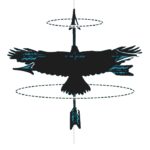I waded through the water to get to you.
I wasn’t dumb enough to believe the casket was you – or even that what was inside the casket was still you. I knew that whatever was left of you had evaporated or rose to the sky or did absolutely nothing. I didn’t know what else to call the casket besides you. It was you, to me, in the bare-bone sense that it was the only thing that could still represent you.
I wasn’t a person who liked to make their mind up about things.
When mother called, she told me you’d started floating down Main Street, and I didn’t believe her. That’s one of the things that always held me back. I never had conviction. My insides – like your insides – were watered down and malleable.
I’d always been self-absorbed.
We were both surprised by the storm. East Texas had never seen clouds that plump and full of desperation. Before the first, and brief, bursts of rain, I stood out in the small patch of grass that comprised my backward and surveyed what was to come.
I figured I’d hold up in the attic with some music and movies until the whole thing blew over. I knew I had to make sure mother’s house was stocked full of food and water because we were about to be cut off from civilization, thanks to the storm. I called to arrange a time to pick her up, but she was more eager to tell me that I should go and see you – just in case.
I always hoped for the worst, and she always prayed for the best.
They say we’re creatures of habit. Actually, we’re creatures of plans – and more plans.
I didn’t make plans to see you before the storm.
Despite my lack of conviction and planning, the sky delivered you to me.
Form always followed function.
I didn’t wade out into the water and grip the sides of the caskets in hopes of slowing you down from wherever the current was taking you. I didn’t wade out into the water because I thought I owed you something for the years of back-and-body breaking work you’d performed.
When I pulled myself onto your casket, I had every intention of steering the rudderless ship away from the town square and back toward the plot of land that was purchased and allotted for your rotted skin and bone-dust. I didn’t know if it was the sudden rush of adrenaline or if it was the fact that I wasn’t sure that we’d survive the storm or if, for the first time, with the houses and shops and buildings that were boarded up to keep the water out, I felt free to convince myself that anything was right, but instead of taking you back to your hole in the ground, I hooked my legs along the thin ridges in the wood and hugged the blunt curve of the casket. I wasn’t hugging your or the thought of you or having some seminal moment that I’d whisper to myself about in moments of reflection.
It was none of that.
I wasn’t emulating death or reflecting on life.
I was just riding the raging bull inside of the china shop.
Somewhere between my front porch and Main Street, I’d convinced myself that saving you was a good plan. Somewhere between grabbing the casket and climbing on top of it, I planned to turn your life around and take it back out to the cemetery.
Form always followed function.
And you form and your function matched my form and my function.
I didn’t lift my head from the casket as I rode through the water. Instead, I closed my eyes and let the thoughts wander. If you’d been buried alive, what would you have done? Used your tendril-like fingers to carve a goodbye message to mother? Count the number of hours – minutes – seconds until you ran out of life? Wonder how you’d made so many mistakes and ended up in such a precarious predicament?
I convinced myself that we had a lot more in common with each other since you died.
And that was nice.
—
You can find Mathew Serback’s poetry, fiction, and nonfiction in The Collapsar, Juked, Dime Show Review, and many other terrific publications.
Photo by: Ana Prundaru
